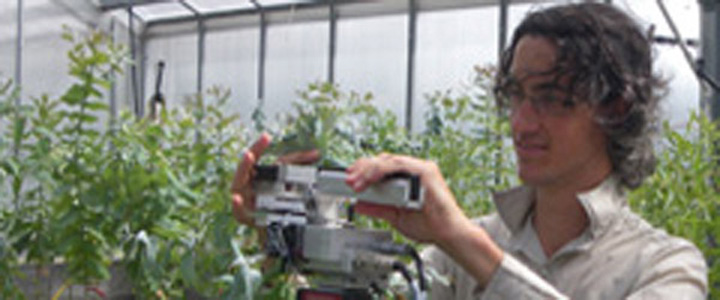Find a career
I Want a career in:
Interview with Dr Patrick Mitchell
Post-doctoral scientist

Case Study
Name: Dr Patrick Mitchell
Position: Post-doctoral scientist
Company: CSIRO, Ecosystem Sciences
Qualifications:
- BSc Hons (Environmental Science)
- PhD (Plant Biology)
What does your job involve?
My job is hard to define, it encompasses such a wide range of activities and roles. As an early career scientist within CSIRO I have a fair degree of autonomy within my operational area, which is researching the response of forests to drought.
Being involved in a portfolio of projects within my work sphere, my job involves; fieldwork, research in glasshouses, modelling biological and environmental systems, collaborating with other people and groups, nationally and internationally, writing grant applications and research papers and reports, organising collaborative workshops and a whole lot more.
What’s a typical working day for you?
Because I am involved in such a wide range of activities, there isn’t a typical day. However, there are things that are common to most days and they are juggling projects, priorities, deadlines and timings and generally multitasking.
I have to schedule meetings and events around the needs of research projects – and I also work with lab technicians and supervise some post-graduate researchers.
What’s the best thing about your job?
For me personally, the best thing about my job is getting the opportunity to think about new ways of doing things, an opportunity to make discoveries and to communicate this to the research and non-research community.
Are there travel opportunities?
Yes, in my role there are lots of reasons to travel. From attending conferences to short stints working at other institutions and doing fieldwork – I frequently spend time either interstate or overseas.
How did you get into this role?
I grew up in the country and have always loved the environment – and I’m naturally curious about how everything works. I really like to be able to look at a process, whether it’s a plant growing or a computer, and have a general understanding of how it functions.
That curiosity led me to an environmental science degree, which is a fascinating mix of sciences, then to honours and a doctorate.
Where could you see your career heading in the future?
At the moment what I am doing is pretty much pure science, that is studying the fundamentals of how plants function. I’m happy doing this – but where could I be in the future? Quite possibly applying the science to help do things like improving the regeneration of forests and native vegetation, in Australia or perhaps in developing countries. I’d like to stay with the CSIRO though, they are a great organisation to work for.
What sort of person do you think would be interested in your job?
Someone who cares for the environment and is curious about the way it works. It’s a scientific role, so a working knowledge of biology, chemistry, physics and maths is essential – plus the ability to think creatively. However, given all that, the major attributes someone doing this job needs are perseverance and good communication skills.
Do you think you are making a difference?
Absolutely. Our forests and ecosystems are a vital part of our planet supporting life and as we place more stress on the environment, understanding them is critical to our future.
We’re looking at the viability and sustainability of our natural systems in the face of changing conditions and demands for water, carbon sequestration and productivity – successfully managing this will make a difference to everyone.
Please note: We spoke to Patrick about his career and what he does day to day. We hope you find this useful and interesting – but please remember, that all jobs are not exactly the same and other roles with the same title may be different in many respects. You should confirm all the details of a particular job with the organisation offering it.